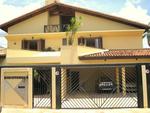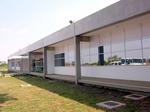Project beneficiaries
Institut de recherche pour le développement
France
Fundação Universidade de Brasília
Brazil
Stichting Koninklijk Nederlands Instituut Voor Zeeonderzoek
The Netherlands
Jacobs University Bremen Ggmbh
Germany
Imperial College London
United Kingdom
Helmholtz-Zentrum Potsdam, Deutsches GeoForschungsZentrum
Germany
Universiteit van Amsterdam
The Netherlands
Università degli Studi di Napoli Federico II
Italy
CLIM-AMAZON consortium
The initial CLIM-AMAZON consortium consists in two beneficiaries that have been working together on collaborative projects for fifteen years: Institut de recherche pour le développement (IRD, France) and Fundação Universidade de Brasília (UnB, Brazil).
IRD - the Coordinator
Founded in 1944, IRD is a non-profit government-funded public organization whose general missions are to conduct research and training with a view to promoting economic, social and cultural development in the Southern Countries. Research performed at IRD covers a wide range of disciplines, with a special focus on the relationship between man and his environment in Southern countries. The aim of IRD is to respond to the major development challenges relating to societies and human health, the earth, the environment and living resources, and to bring the benefits of research to sustainable development to improve people’s lives. IRD is also a funding agency via the Agence Inter-établissements de Recherche pour le Développement (AIRD) and facilitates the overseas deputation of scientists for long periods of time.
Besides IRD head offices in Marseille, France, IRD has a representation in Brasilia, Brazil. The French scientists involved in the project come from the joint laboratory GET (Géosciences Environnement Toulouse) , a so-called Unité Mixte de Recherche (UMR) between 3 research organizations: IRD, CNRS (Centre National de la Recherche Scientifique) and UPS (Université Paul Sabatier of Toulouse) , France. Several tens of people have been already sent via IRD at UnB in Brasilia for periods extending from two months to several years. They included IRD scientists and engineers as well as scientists from other French partner institutions.
UnB - the Co-coordinator
Founded in 1962 as the utopia of anthropologist and educator Darcy Ribeiro, two years after the inauguration of the new Brazilian capital, UnB is the national point of reference in research, teaching and extension. It has 103 undergraduate programs, 67 masters programs and 45 PhD programs. It relies on exchange and on cooperation with foreign organizations and institutions of higher education. The Masters and PhD Degrees of IG (Instituto de Geociências) are among the Brazilian most renowned in the area of geosciences. The institute, which receives students from all over Brazil and South America, has focused its research in different research areas.
Placed within the IG, the Geochronos Lab (Laboratório de Geocronologia) is part a national network created in 2004 and headed by the Brazilian Ministry of Mines and Energy and the giant oil company Petrobras, which is devoted to geochronological, geodynamic and environmental studies. It has one of the best infrastructures dedicated to geochronology and isotope geochemistry of Brazil. The lab analyzes in routine the isotopes of the following elements: Sm, Nd, Sr, U, Pb, Th, Lu, Hf, C, O, N, S, H, Fe, Zn, and Cu. These analyses are performed in different material including rock, minerals, water and organics, most of them to attend IG, as well as other research centres of Brazil, from other countries of South America, and even from Europe. A future expansion of the Geochronos Lab is going to add 1.5 thousand square meters of new laboratories and offices by 2014, for a funding of 2 million reais.
Besides IG, the European participants of CLIM-AMAZON project will also work closely with professors of IQ (Instituto de Química) at UnB.
CLIM-AMAZON in the XV Brazilian Congress of Geochemistry - Brasilia 2015- 2015 Annual Meeting/ 4th Workshop and Clim-Amazon results presentation in the 6th Ore-Hybam Conference - Cusco 2015
For the CLIM-AMAZON project fencing, the 4th CLIM-AMAZON Workshop and the International Symposium on Climate and Geodynamics of Amazon Basin (2015 CLIM-AMAZON Annual Meeting) will take place in Brasilia on the 21st and 22nd of October 2015, respectively, during the XV Brazilian Geochemistry Congress (19th-22th October 2015).
The CLIM-AMAZON results will be presented also in Cusco during the 6th Ore-Hybam Conference (26th-30th October 2015).
For more information about the XV Brazilian Geochemistry Congress, click here:
http://www.sbgq.org.br/15cbgq/
For more information about the 6th Ore-Hybam conference, click here
6th HYBAM Scientific Meeting - Cusco 2015 (1.29 Mo)



